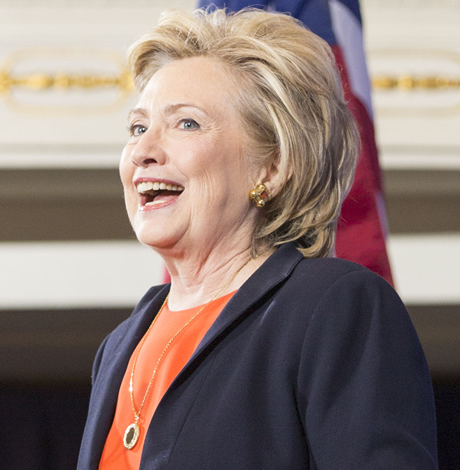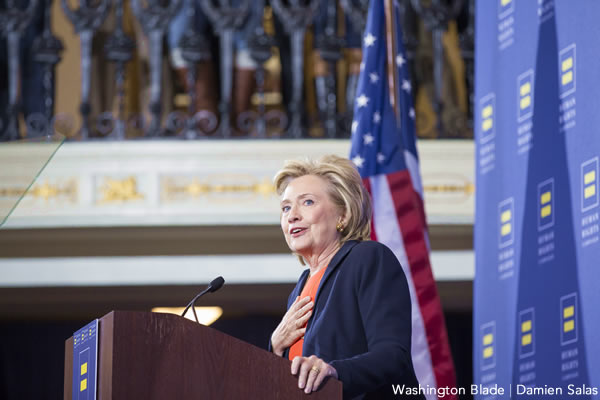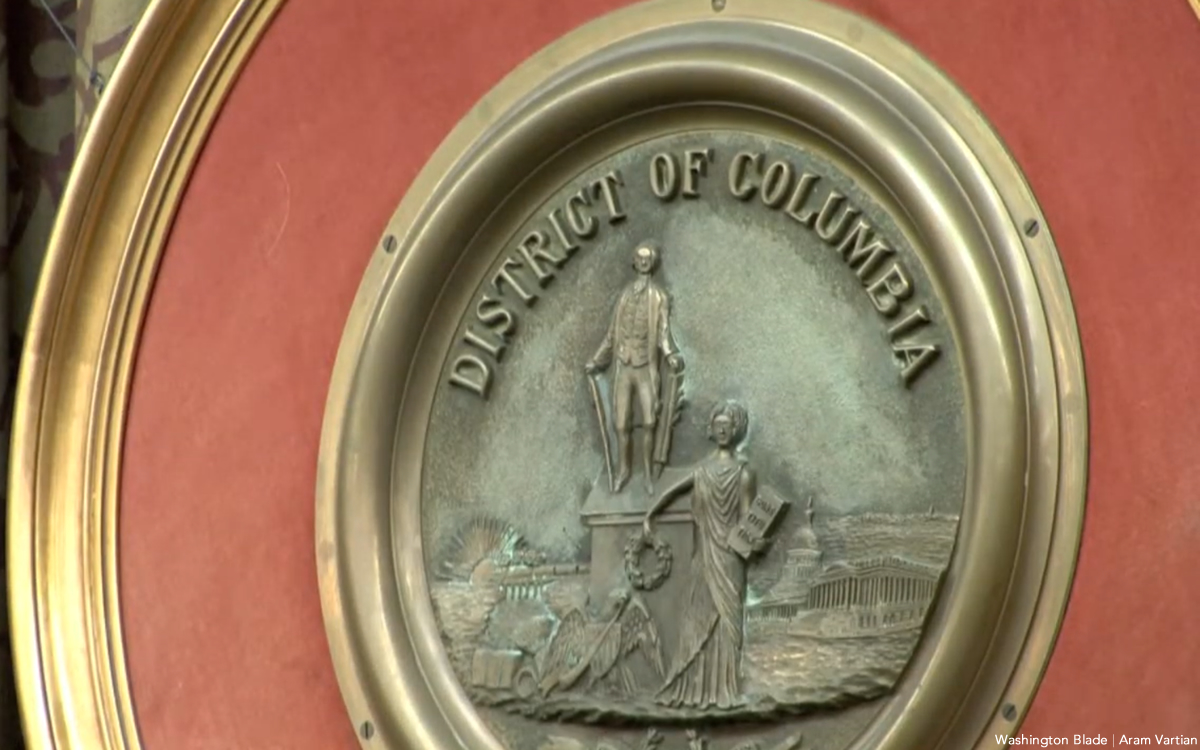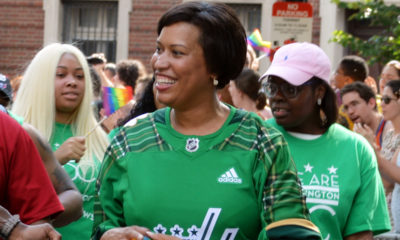Opinions
Coming out for Hillary Clinton
She will stand with LGBT community, rebuild Dem party


Hillary Clinton(Washington Blade file photo by Damien Salas)
Like many Democrats, I have spent the last six or seven months following the campaigns of Sen. Bernie Sanders, Gov. Martin O’Malley and Secretary Hillary Clinton. I have read their campaign literature, watched them debate one another, saw their positions dissected by political pundits and even had the opportunity to hear each of the three remaining candidates address the Democratic National Committee meeting in Minneapolis last summer. I even had brief conversations with O’Malley and Clinton. I have been impressed by each candidate’s love for our country and our Democratic principles as well as their sincerity in their desire to build upon the accomplishments of President Obama and his administration, which have positively impacted the lives of so many LGBTQ Americans over the past seven years.
I would also be disingenuous if I did not confess that I had a broader knowledge of Secretary Clinton’s public service than the other two candidates before the campaign started. I had to be clear in my mind what are the important factors for me to support one of these fine Americans to be my president. Though there are many issues in the 2016 campaign, the issues that are the most important to me are LGBTQ equal rights, our economy, Black Lives Matter and the state of the Democratic Party.
I believe that Secretary Clinton has the most experience and the deepest understanding about how to use the power of the presidency to significantly improve the lives of ordinary Americans. I also believe she will continue to bring qualified LGBTQ women and men to into government service, ensuring that an agenda is furthered that genuinely affects the life of our communities. I know she and her administration will continue to develop policies that provide justice and opportunity, especially for transgender Americans who have been so marginalized and experienced so much indifference as evidenced by a Congress led by deeply homophobic Republicans. I strongly believe that a President Hillary Clinton will continue to build on President Obama’s legacy of LGBTQ empowerment and dignity.
Although not always fully embraced by some Americans, President Obama’s economic policies have contributed to 70 consecutive months of private-sector job growth. Clinton’s proposed economic policies will build on this foundation to expand opportunities for our younger people as well as communities of color through expanded investments in education and in job training to allow more Americans to achieve their financial hopes and dreams.
I believe the Black Lives Matter movement represents a powerful response to the lack of social, judicial and economic justice that so many black Americans have been denied far too long. It’s not simply about injustice at the hands of law enforcement but the generations of systemic social and economic injustice that so many black people have had to endure. The fact that some black people have been able to overcome some of these barriers is more a credit to our endurance as a people than the fairness of the system. I realize that no leader can change this overnight but Clinton understands — as does President Obama — that policy changes on the federal level can tilt the scales of injustice to justice as appointing fair judges and use of the Justice Department create a legal system of fairness for all.
Finally, as a Democrat, I believe in fair and just immigration reform, the right of workers to earn a fair wage, women’s reproductive rights and a host of other issues that some would say are progressive. As such, I have been concerned about my party’s inability to win local and statewide elections in many parts of our nation. I know that Clinton will work with the Democratic National Committee to rebuild our Democratic state parties so we can push back the Republican tide of racism, sexism and homophobia gripping many parts of America. Who knows? Maybe Bill Clinton can be our party chairman in 2017. I will be casting my ballot for Hillary Clinton at the Democratic National Convention this July in Philadelphia.
Earl Fowlkes is a Democratic National Committee At-Large member and chair of the DNC LGBT Caucus. He is also president of the D.C.-based Gertrude Stein Democratic Club.
Opinions
New research shows coming out is still risky
A time of profound psychological vulnerability

Coming out is often celebrated as a joyful milestone – a moment of truth, pride, and liberation. For many LGBTQ+ people, that’s exactly what it becomes. But new research I co-authored, published in the journal Pediatrics this month, shows that the period surrounding a young person’s first disclosure of their sexual identity is also a time of profound psychological vulnerability. It’s a fragile window we are not adequately protecting.
Using data from a national sample of lesbian, gay, and bisexual people, our study examined what happens in the years before and after someone comes out to a family member or a straight friend. We weren’t looking at broad lifetime trends or comparing LGBTQ+ youth to heterosexual peers. Instead, we looked within each person’s life. We wanted to understand how their own suicide risk changed around the moment they first disclosed who they are.
The results were unmistakable. In the year a person came out, their likelihood of having suicidal thoughts, developing a suicide plan, or attempting suicide increased sharply. Those increases were not small. Suicide planning rose by 10 to 12 percentage points. Suicide attempts increased by 6 percentage points. And the elevated risk didn’t fade quickly. It continued in the years that followed.
I want to be very clear about what these results mean: coming out itself is not the cause of suicidality. The act of disclosure does not harm young people. What harms them is the fear of rejection, the stress of navigating relationships that suddenly feel uncertain, and the emotional fallout when people they love respond with confusion, disapproval, or hostility.
In other words, young LGBTQ+ people are not inherently vulnerable. We make them vulnerable.
And this is happening even as our culture has grown more affirming, at least on the surface. One of the most surprising findings in our study was that younger generations showed larger increases in suicide risk around coming out compared to older generations. These are young people who grew up with marriage equality, LGBTQ+ celebrities, Pride flags in classrooms, and messaging that “it gets better.”
So why are they struggling more?
I think it’s, in part, because expectations have changed. When a young person grows up hearing that their community is increasingly accepted, they may expect support from family and friends. When that support does not come, or comes with hesitation, discomfort, or mixed messages, the disappointment is often devastating. Visibility without security can intensify vulnerability.
Compounding this vulnerability is the broader political environment. Over the last several years, LGBTQ+ youth have watched adults in positions of power debate their legitimacy, restrict their rights, and question their place in schools, sports, and even their own families. While our study did not analyze political factors directly, it is impossible to separate individual experiences from a climate that routinely targets LGBTQ+ young people in legislative hearings, news cycles, and social media.
When you’re 14 or 15 years old and deciding who to tell about your identity, the world around you matters.
But the most important takeaway from our study is this: support is important. The presence, or absence of family acceptance is typically one of the strongest predictors of whether young people thrive after coming out. Research consistently shows that when parents respond with love, curiosity, and affirmation, young people experience better mental health, stronger resilience, and lower suicide risk. When families reject their children, the consequences can be life-threatening.
Support doesn’t require perfect language or expertise. It requires listening. It requires pausing before reacting out of fear or unfamiliarity. It requires recognizing that a young person coming out is not asking you to change everything about your beliefs. They’re asking you to hold them through one of the most vulnerable moments of their life.
Schools, too, have an enormous role to play. LGBTQ+-inclusive curricula, student groups, and clear protections against harassment create safer environments for disclosure.
Health care settings must also do better. Providers should routinely screen for mental health needs among LGBTQ+ youth, especially around the time of identity disclosure, and offer culturally competent care.
And as a community, we need to tell a more honest story about coming out. Yes, it can be liberating. Yes, it can be beautiful. But it can also be terrifying. Instead of pretending it’s always a rainbow-filled rite of passage, we must acknowledge its risks and surround young people with the support they deserve.
Coming out should not be a crisis moment. It should not be a turning point toward despair. If anything, it should be the beginning of a young person’s journey toward authenticity and joy.
That future is possible. But it depends on all of us – parents, educators, clinicians, policymakers, and LGBTQ+ adults ourselves – committing to make acceptance a daily practice.
Young LGBTQ+ people are watching. And in the moment they need us most, they must not fall into silence or struggle alone.
Harry Barbee, Ph.D., is an assistant professor at the Johns Hopkins Bloomberg School of Public Health. Their research and teaching focus on LGBTQ+ health, aging, and public policy.
Letter-to-the-Editor
Candidates should pledge to nominate LGBTQ judge to Supreme Court
Presidential, Senate hopefuls need to go on the record

As soon as the final votes are cast and counted and verified after the November 2026 elections are over, the 2028 presidential cycle will begin in earnest. Polls, financial aid requests, and volunteer opportunities ad infinitum will flood the public and personal media. There will be more issues than candidates in both parties. The rending of garments and mudslinging will be both interesting and maybe even amusing as citizens will watch how candidates react to each and every issue of the day.
There is one particular item that I am hoping each candidate will be asked whether in private or in public. If a Supreme Court vacancy occurs in your potential administration, will you nominate an open and qualified LGBTQ to join the remaining eight?
Other interest groups on both sides have made similar demands over the years and have had them honored. Is it not time that our voices are raised as well? There are several already sitting judges on both state and federal benches that have either been elected statewide or approved by the U.S. Senate.
Our communities are being utilized and abused on judicial menus. Enough already! Challenge each and every candidate, regardless of their party with our honest question and see if honest answers are given. By the way … no harm in asking the one-third of the U.S. Senate candidates too who will be on ballots. Looking forward to any candidate tap dancing!
Opinions
2026 elections will bring major changes to D.C. government
Mayor’s office, multiple Council seats up for grabs

Next year will be a banner year for elections in D.C. The mayor announced she will not run. Two Council members, Anita Bonds, At-large, and Brianne Nadeau, Ward 1, have announced they will not run. Waiting for Del. Norton to do the same, but even if she doesn’t, there will be a real race for that office.
So far, Robert White, Council member at-large, and Brooke Pinto, Council member Ward 2, are among a host of others, who have announced. If one of these Council members should win, there would be a special election for their seat. If Kenyon McDuffie, Council member at-large, announces for mayor as a Democrat, which he is expected to do, he will have to resign his seat on the Council as he fills one of the non-Democratic seats there. Janeese George, Ward 4 Council member, announced she is running for mayor. Should she win, there would be a special election for her seat. Another special election could happen if Trayon White, Ward 8, is convicted of his alleged crimes, when he is brought to trial in January. Both the Council chair, and attorney general, have announced they are seeking reelection, along with a host of other offices that will be on the ballot.
Many of the races could look like the one in Ward 1 where at least six people have already announced. They include three members of the LGBTQ community. It seems the current leader in that race is Jackie Reyes Yanes, a Latina activist, not a member of the LGBTQ community, who worked for Mayor Fenty as head of the Latino Affairs Office, and for Mayor Bowser as head of the Office of Community Affairs. About eight, including the two Council members, have already announced they are running for the delegate seat.
I am often asked by candidates for an endorsement. The reason being my years as a community, LGBTQ, and Democratic, activist; and my ability to endorse in my column in the Washington Blade. The only candidate I endorsed so far is Phil Mendelson, for Council chair. While he and I don’t always agree on everything, he’s a staunch supporter of the LGBTQ community, a rational person, and we need someone with a steady hand if there really are six new Council members, out of the 13.
When candidates call, they realize I am a policy wonk. My unsolicited advice to all candidates is: Do more than talk in generalities, be specific and honest as to what you think you can do, if elected. Candidates running for a legislative office, should talk about what bills they will support, and then what new ones they will introduce. What are the first three things you will focus on for your constituents, if elected. If you are running against an incumbent, what do you think you can do differently than the person you hope to replace? For any new policies and programs you propose, if there is a cost, let constituents know how you intend to pay for them. Take the time to learn the city budget, and how money is currently being spent. The more information you have at your fingertips, the smarter you sound, and voters respect that, at least many do. If you are running for mayor, you need to develop a full platform, covering all the issues the city will face, something I have helped a number of previous mayors do. The next mayor will continue to have to deal with the felon in the White House. He/she/they will have to ensure he doesn’t try to eliminate home rule. The next mayor will have to understand how to walk a similar tightrope Mayor Bowser has balanced so effectively.
Currently, the District provides lots of public money to candidates. If you decide to take it, know the details. The city makes it too easy to get. But while it is available, take advantage of it. One new variable in this election is the implementation of rank-choice voting. It will impact how you campaign. If you attack another candidate, you may not be the second, or even third, choice, of their strongest supporters.
Each candidate needs a website. Aside from asking for donations and volunteers, it should have a robust issues section, biography, endorsements, and news. One example I share with candidates is my friend Zach Wahls’s website. He is running for United States Senate from Iowa. It is a comprehensive site, easy to navigate, with concise language, and great pictures. One thing to remember is that D.C. is overwhelmingly Democratic. Chances are the winner of the Democratic primary will win the general election.
Potential candidates should read the DCBOE calendar. Petitions will be available at the Board of Elections on Jan. 23, with the primary on June 16th, and general election on Nov. 3. So, ready, set, go!
Peter Rosenstein is a longtime LGBTQ rights and Democratic Party activist.


















